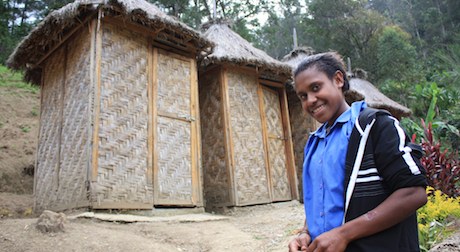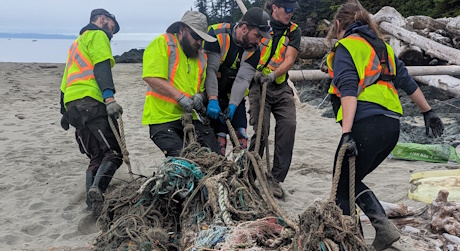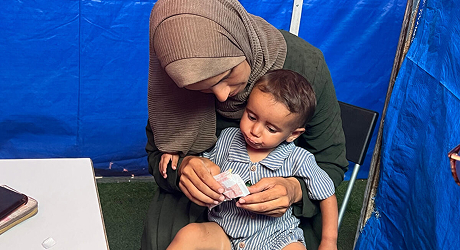Footprints Project
Since 2005, travelers like you have helped us change the world through micro-donations.

-
A total of
9445
Travelers
-
donated
$20000.52
(100% funded) -
to help improve
Water & Sanitation
-
impacting
300
people -
in
Papua New Guinea
Program successes
This project has met its aim to provide students at one rural school in Papua New Guinea (PNG) with adequate access to toilets and clean water for hand-washing and drinking.

Photo: Kau school is located in the Eastern Highlands of PNG, about 30 minutes’ walk from the main road.
Previously, students at Kau school were using dangerous and unhygienic toilets (see photo below). These toilets did not adequately meet the students’ sanitation needs and were located on a steep hill that was prone to subsiding in heavy rain. The younger students especially did not like using these toilets because they were afraid of falling between the logs and complained that they smelled very bad.

Photos: Left: old toilets. Right: new toilets
Thanks to the support of Footprints Network partners, this project constructed six new ventilated improved pit (VIP) toilets (three for the girls and three for the boys). These toilets are specially designed with vent pipes and cement slabs to minimise bad smells and to trap flies and other flying insects below in the pit – a key vector of disease. The cement slabs are also much easier to keep clean and maintain then toilets made out of traditional bush materials.
The Headmaster and the parents’ association decided to apply for additional funds from the Department of Education and upgraded the new toilets with permanent materials for the walls and doors.

Photo: The Headmaster also took the initiative to locate the school’s new tapstand on the path that directly leads from the toilets to the school classrooms . This foresight aims to provide a regular reminder to children to wash their hands after using the toilet.
In PNG, adolescent girls sometimes stay home when they are menstruating because they do not have a private place to wash. This project provided a shower block for the girls in response to these needs. We anticipate that these new facilities, together with the toilets, will make a big impact on girls’ and their parents’ decisions to stay in school past adolescence.
In addition to the new latrines and shower block, this project was able to provide the school with a sustainable and safe drinking water supply. The students had previously had to bring water to school with them or walk to collect their drinking water from an unprotected creek that was often contaminated by upstream pollution from the nearby village. Now the students are able to access sufficient clean water for drinking and handwashing from two new 9,000L rainwater tanks.
As well as the new infrastructure, the project provided the school girls’ with information session on menstruation management – a taboo topic in PNG that often leads to misinformation and shame.

Photo: “We are very excited about the new toilets – they are clean and look much nicer than our old toilets” – Schoolgirls at Kau school, Eastern Highlands Province
Challenges
Schools in PNG have a high turnover of teaching staff, particularly in rural areas such as where Kau school is located. This can impact on the sustainability of infrastructure projects such as this one because it means that the new staff are not as engaged in maintaining the facilities. This project aimed to engage with parents through the school management board to address this issue.
The teachers’ have also established a cleaning roster for the students who are responsible for cleaning the new school toilets.
Partnership
This project was carried out by ATprojects, one of WaterAid’s local partner organisations in PNG. WaterAid and ATprojects have been delivering school WASH projects together in the Eastern Highlands Province of PNG for almost ten years.
Program timeline
This project commenced in October 2012 and was completed in June 2013. All construction and hygiene promotion activities are now complete for this school.
Traveling soon? When you buy travel insurance with us, you can make a contribution towards a cause you care about.
Get a quote




